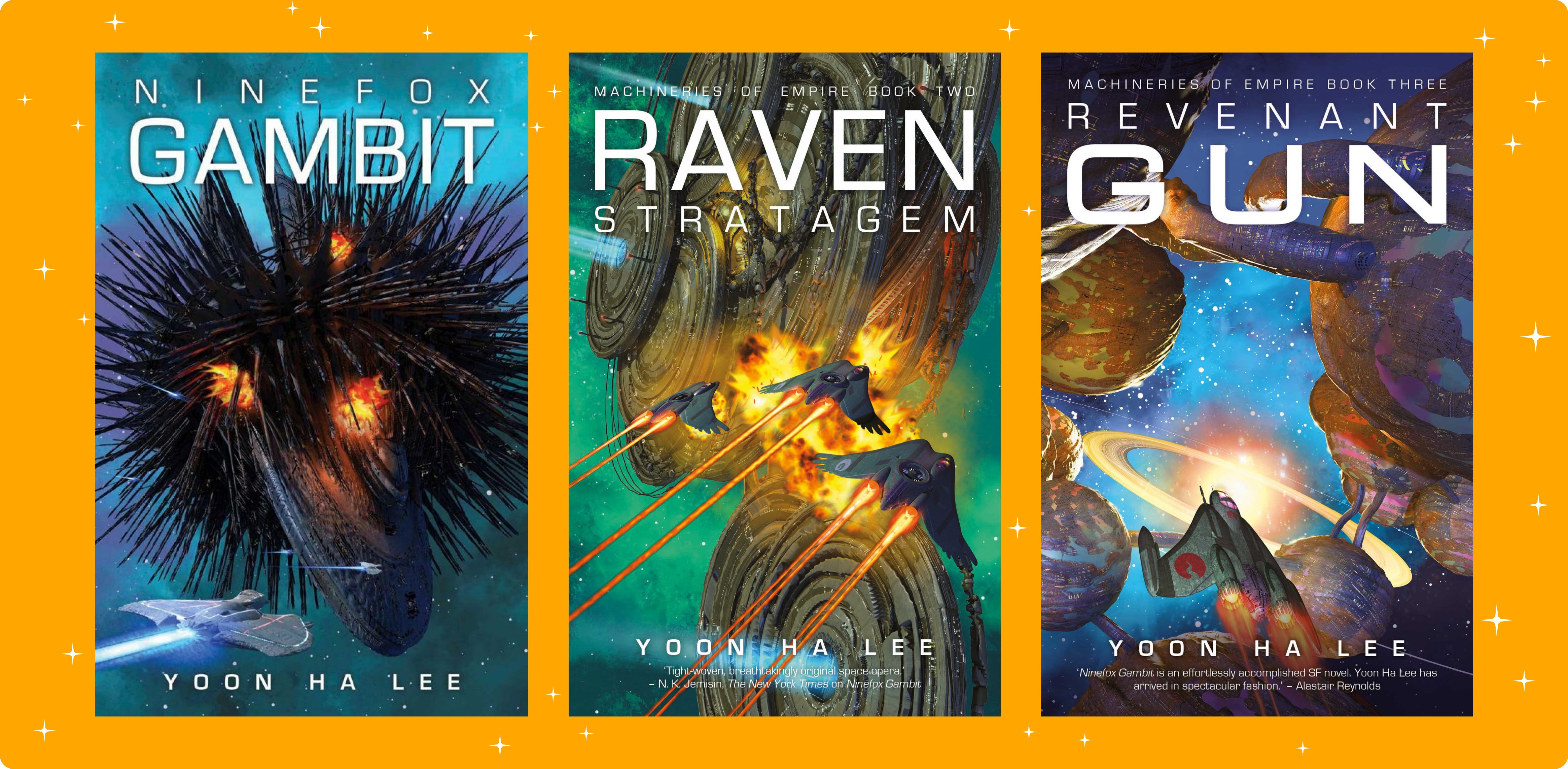Ninefox Gambit by Yoon Ha Lee
Ideology, mathematics, space magic… and heresy. Welcome to Ninefox Gambit!

Published in 2016 by Solaris Books, Ninefox Gambit is the first book in the Machineries of Empire military sci-fi/space opera trilogy by Yoon Ha Lee. It received the Locus Award for Best First Novel and was nominated for the Nebula and Hugo awards. The series’ second and third books, Raven Stratagem and Revenant Gun, were also nominated for the Hugo Award in 2018 and 2019 respectively.
While Ninefox Gambit was Yoon Ha Lee’s first novel, Yoon Ha Lee has been a major name in the world of science fiction long before with his numerous short stories being published in several collections and science fiction magazines. There is even a short story collection with stories set in the world of Ninefox Gambit called Hexarchate Stories published in 2019.
This review will focus only on Ninefox Gambit, and I will post separate reviews for the rest of the books in the series.

The story
Captain Kel Cheris learns that proving herself on the battlefield against heretics is a double-edged sword when her company is disbanded and she is sent to fight against an even more dangerous enemy.
But she is not going alone.
With her, the Hexarchate also sends the undead general Shuos Jedao, a madman and a genius responsible for the deaths of millions of people. Four hundred years ago, Jedao was the greatest military mind the Hexarchate had ever seen. He won every battle he ever fought and he was sent into many of them precisely because they were considered to be unwinnable. He was the most celebrated strategist in the Hexarchate. That is until, in his final battle, Jedao decided it would be more fun to kill two armies instead of one: the enemy’s and that of his own.
Instead of executing him for high treason, the Hexarchate decided to put Jedao into storage so that, whenever a situation is dire enough to warrant bringing him out, the most dangerous man who has ever lived is let out again, to wreak havoc against the enemy.
Now, on the eve of war against one of the most dangerous heresies in living memory, Cheris must rely on the man who is almost certain to, at some point, go mad and lead her army to certain death.
Unfortunately, that man is also her only chance to win this war. Because this time, the enemy has taken over one of the most important places in the Hexarchate: a fortress at the very heart of the empire designed to never ever be conquered.
I enjoyed both Ninefox Gambit protagonists immensely.
Cheris is a brilliant mathematician who has to navigate her way through politics and ideology (ideology that, in this world, manifests in a very tangible way) while also solving very real tactical problems. She is keenly aware of the fact that she is a pawn in one of Hexarchate’s countless games.
Her options are limited by those manipulating her and her only way out is through.
And Jedao—oh, Jedao is just awesome. I’m a sucker for older, wiser mentor types who are ten steps ahead of everyone else. Jedao is a badass who has earned the right to get away with just about anything. He knows that he is one of the most feared people in the Hexarchate, and he leans into it to get what he wants.
Once known as the Ninefox Crowned with Eyes, he is now feared as the Immolation Fox.
The point of war is to rig the deck, drug the opponent, and threaten to kneecap their family if they don't fold.
The magic (and the world)
The magic system, which permeates the story from the very first page, is what makes reading the Ninefox Gambit so unique and so challenging—and by the same token, so very rewarding.
While magic serves as an essential element of the story, Yoon Ha Lee never really explains what it is and how it works. We only get to experience the exotic effects of the variant machines and the weirdly specific effects that occur around a group of soldiers standing in a particular formation—if the formation is broken, the effects vanish, or worse, change to something unintended!
To make things weirder, the magic system is based on calendars of all things! Everything hinges on mathematically derived ways of measuring time and people’s adherence to a set calendar. And when an empire’s entire existence depends on the intended effects of this magic, it makes for a world that is wholly different and alien compared to our own. Indeed, as I was reading it, I felt like I was only barely able to grasp the kind of world the book takes place in (which is to say that the author’s done an amazing job building a world heavily influenced by magic).
And while the author does give us tidbits throughout the book, what really helps us understand this magic is seeing how it functions in different contexts and under different circumstances. This is how the vague and truly alien concepts become clear and almost tangible as the book progresses.
But to say much else would be to spoil you the pleasure of discovering it for yourself.
Instead, here are some other interesting facts about the rich world Yoon Ha Lee has created:
- The Hexarchate is divided into 6 factions where every faction is in charge of a certain aspect of the Hexarchate. Each faction is represented by a mythical animal and, as is the case of every book with a good faction system, 70 percent of each character’s personality is dictated by the faction they belong to. For example, there are Shuos, who are spies and bureaucrats. Their faction is represented by a nine-tailed fox, and they are all, every single one of them, psychopaths.
- Some characters’ pastime includes fencing using something called “calendrical swords” and it sounds awesome.
- There are sentient robots called servitors, who are often shaped like animals. They have their own society and culture and they love Cheris.
The writing
Ninefox Gambit is packed with plot. It’s astonishing to see how much more efficient science fiction is compared to fantasy which has leaned into producing these huge lumbering book behemoths.
It felt like every single paragraph introduced a new concept or added a new piece of worldbuilding. And while, as mentioned above, it does make the learning curve a bit steep, it also makes the story feel like it’s always progressing at a good pace. Yoon Ha Lee comfortably keeps adding new developments that will tickle the reader’s brain and keep them entertained—and well-occupied.
Near the end, when there’s not much room for new ideas, we start getting mini-chapters told from the perspective of various characters involved in the key moments of the war.
And with all this variety, I can honestly say that I was not even once bored while reading this book.
I’m a procrastinator. I procrastinate. And sometimes, when I get to a boring part of a book, it feels like a chore to continue reading so I put it down and it gets hard to pick it up again. With Ninefox Gambit, this never happened. Whenever I closed this book, I was excited to pick it back up and anxious to find out what new developments Yoon Ha Lee was going to throw at me. This constant intake of concepts and tactics kept my brain well-fed and able to perform feedback loops in which Lee’s world became increasingly clearer.
The conclusion
Ninefox Gambit is a top-notch military sci-fi that is challenging and quite grim at times. Yet despite this difficulty, it is a quick read for those who can just go with the flow and pick things up along the way.
With its quick pace and moments of darkness, I am tempted to compare it to The Black Company on the fantasy side of things. Yoon Ha Lee is not afraid to take risks—he takes many, to much success—and I highly recommend Ninefox Gambit to anyone who is looking to read more creative and rewarding modern science fiction.





